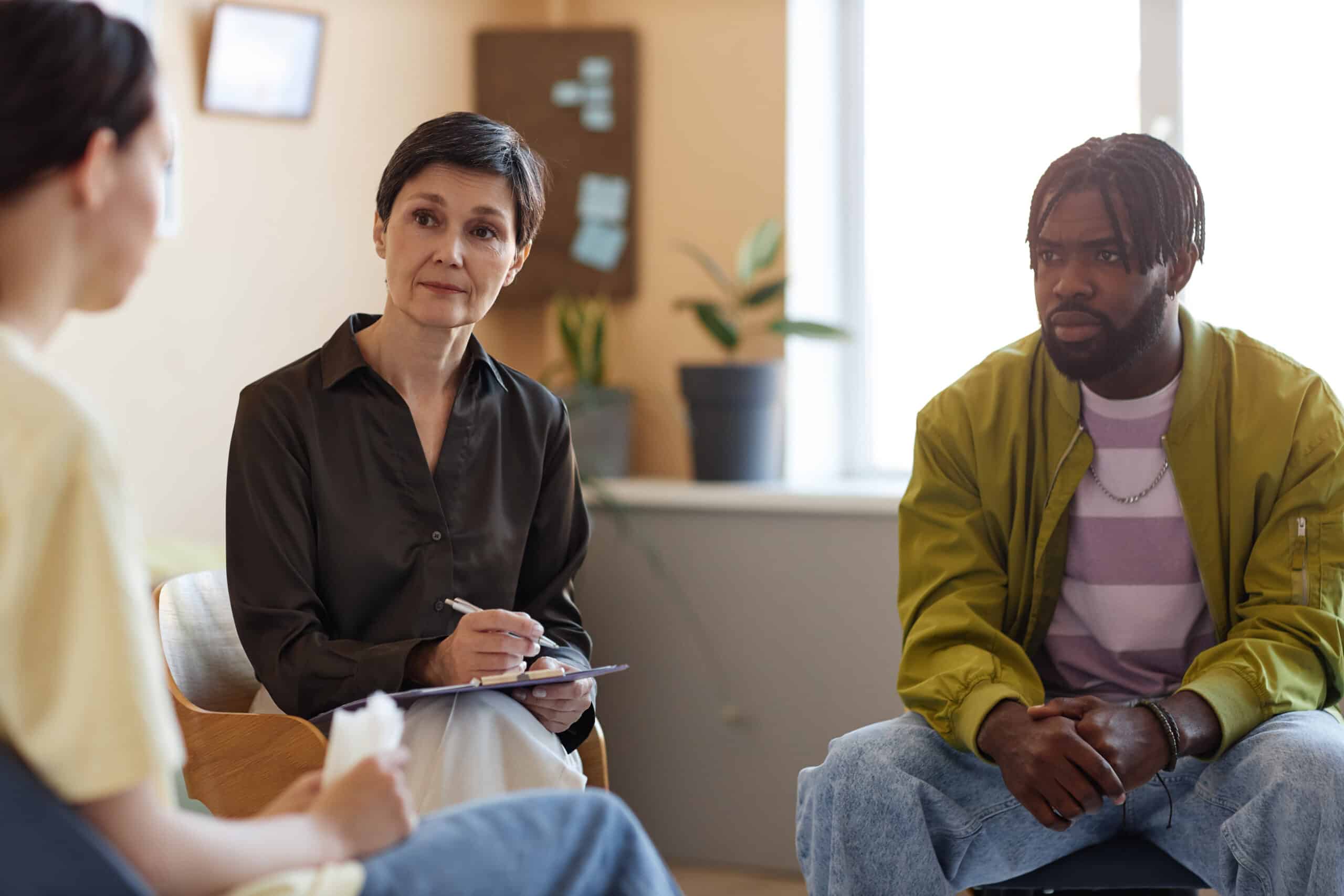How to Help an Addict
Initiating a conversation about addiction is one of the most important yet challenging steps in helping a loved one. With nearly 21 million Americans struggling with substance use disorders and only 10% receiving treatment, compassionate communication can play a crucial role in motivating them to seek help.
Choose a calm, private setting where you can speak openly without interruptions, ensuring both you and your loved one are sober and emotionally steady. Approaching the discussion during a stressful moment or when high tensions can lead to defensiveness or conflict, reducing the chances of a productive conversation.
When expressing your concerns, use empathetic and non-judgmental language. Instead of saying, “You’re ruining your life with drugs,” frame your observations with statements like, “I’ve noticed you seem overwhelmed, and I’m worried about you.” This approach shows care and avoids blame, which can alienate the person further. Share specific behaviors you’ve observed, such as missing work or withdrawing from family, to help them understand the tangible impact of their substance use.
Focus on offering support rather than issuing ultimatums. Let them know you’re there to help them take positive steps, whether exploring treatment options or simply being a source of emotional support. A compassionate, understanding tone can lay the foundation for recovery while fostering trust and openness.

Understanding Addiction
To effectively help an addict, it’s crucial to understand addiction as a complex condition rather than a simple choice. Addiction is influenced by a combination of biological, psychological, and environmental factors that affect how the brain functions. These changes make it challenging for individuals to stop using substances despite harmful consequences. Recognizing these influences can foster empathy and guide your approach to supporting your loved one.
A Family History of Addiction
Genetics plays a significant role in an individual’s susceptibility to addiction. Research shows that a family history of substance abuse can increase the likelihood of developing addiction due to inherited traits that affect brain chemistry and impulse control. Understanding this genetic predisposition can help you approach the situation without judgment, recognizing that addiction may not entirely be within the person’s control.
Exposure to Trauma, Neglect, or Abuse
Adverse childhood experiences (ACEs), such as trauma, neglect, or abuse, are strongly linked to substance abuse later in life. Individuals may turn to drugs or alcohol as a way to cope with unresolved emotional pain or to numb difficult memories. Recognizing these underlying causes can help you support your loved one with compassion and encourage trauma-informed treatment.
Co-Occurring Mental Health Disorders
Addiction often coexists with mental health conditions such as anxiety, depression, or post-traumatic stress disorder (PTSD). These disorders can increase vulnerability to substance abuse as individuals attempt to self-medicate to alleviate symptoms. Effective treatment must address both addiction and underlying mental health issues, which are often interlinked.
Peer Pressure and Social Environments
Social factors, including peer pressure and environments that normalize substance use, can heavily influence addiction. Adolescents and young adults are particularly vulnerable to this type of influence, as they may seek acceptance or experiment in high-risk settings. Recognizing the impact of social dynamics can help you identify triggers and create a plan to remove harmful influences.
Why Understanding Addiction Matters
Recognizing the complexity of addiction and its contributing factors allows you to approach your loved one with empathy rather than blame. Addiction is rarely a standalone issue; it often stems from a web of interrelated factors that require professional intervention and holistic care. By understanding these root causes, you can better support your loved one in seeking effective treatment and building a path toward recovery.
Signs Someone May Be Struggling with Addiction
Identifying the signs of addiction early is crucial for providing timely support. Addiction is a condition that impacts various aspects of a person’s life, often in ways that are both visible and hidden. It can cause significant emotional, physical, and behavioral changes, which may escalate over time. Awareness of these signs can help you approach your loved one with care and guide them toward seeking help.
Addiction often manifests differently from person to person, but there are several common indicators to watch for:
- Changes in behavior, such as secrecy or withdrawal from loved ones.
Individuals struggling with addiction may become isolated, avoid social interactions, or exhibit unusual levels of secrecy. This can include lying about their whereabouts or activities to conceal substance use. - Financial difficulties or unexplained spending habits.
Addiction can lead to sudden financial strain as individuals prioritize buying substances over managing everyday expenses. They might frequently ask for money, sell belongings, or neglect bills and financial responsibilities. - Physical health declines, including weight loss, fatigue, or poor hygiene.
Physical signs like a change in weight, persistent exhaustion, or a lack of attention to personal grooming are often linked to addiction. Certain substances may also cause symptoms like bloodshot eyes, trembling, or frequent illnesses. - Frequent mood swings, irritability, or signs of anxiety and depression.
Emotional instability is a common sign of addiction. The individual may appear irritable, anxious, or depressed, with frequent mood changes that seem disproportionate or unrelated to external circumstances. - Neglect of responsibilities at work, school, or home.
Addiction often leads to a decline in productivity and accountability. This might include missed deadlines, absenteeism, or failure to maintain family or household duties.
Recognizing these signs is a vital step in addressing addiction. While it can be difficult to acknowledge that a loved one may be struggling, understanding these behaviors as symptoms of a deeper issue allows you to respond with compassion. If you observe these warning signs, consider having an open, empathetic conversation and exploring professional resources to help your loved one take the first steps toward recovery.
How to Help an Addict
Helping an addict can feel overwhelming, but small, intentional actions can lead to meaningful change. Here are some steps to take:
Educate Yourself About Addiction
The first step in helping a loved one with addiction is understanding the nature of the condition. Addiction is a disease, not a moral failing, and recognizing this distinction can help you approach the situation with compassion. Learning about how addiction affects the brain and behavior equips you with the knowledge to recognize patterns of substance use and better understand what kind of help they might need. Educational resources, such as articles, books, and support groups, can provide valuable insights and prepare you for meaningful conversations.
Communicate with Empathy
When addressing addiction, it’s crucial to use a calm, empathetic, and non-judgmental tone. Express your concerns by focusing on specific examples of behavior rather than making accusations. For instance, you might say, “I’ve noticed you’ve been missing work more often and seem tired lately. I’m worried about how you’re feeling.” This approach conveys care and concern while avoiding blame, which can lead to defensiveness. Open communication is the foundation for building trust and encouraging them to consider seeking help.
Encourage Professional Help
Addiction is a complex condition that often requires professional treatment to address its physical, emotional, and psychological components. Detoxification, therapy, and ongoing support are essential for recovery. Villa Oasis offers residential treatment for intensive, round-the-clock care, outpatient programs for those needing flexibility, and sober living homes that provide a structured environment during the transition back to independent life. Encouraging your loved one to connect with professional services is one of the most effective ways to support their recovery journey.
Support Their Recovery Journey
Recovery is not a one-time event but an ongoing process that requires consistent effort and encouragement. Supporting your loved one can include attending therapy sessions or support groups, promoting healthy habits like exercise and proper nutrition, and celebrating even small milestones along the way. Your presence and encouragement can reinforce their commitment to recovery and remind them that they are not alone.
Take Care of Yourself
Supporting someone with addiction can be emotionally and physically draining, making it vital to prioritize your own well-being. Research shows that family members of individuals with substance use disorders are at a higher risk of experiencing anxiety, depression, and stress-related health problems. To effectively care for your loved one, you must first ensure that you’re in a good place mentally and emotionally. This might mean seeking therapy, joining a support group like Al-Anon, or dedicating time to activities that recharge you. Taking care of yourself can provide consistent and compassionate support without becoming overwhelmed or burned out, ultimately benefiting you and your loved one.
Common Challenges in Helping an Addict
Even with the best intentions, helping an addict can come with obstacles:
Denial
Many individuals struggling with addiction do not recognize the severity of their problem. If your loved one is in denial, express concern without forcing them to accept help immediately.
Relapse
Relapse is a standard part of recovery, and while it can be discouraging, it does not mean failure. Instead, they view relapse as an opportunity to revisit and strengthen their treatment plan.
Enabling Behavior
It’s important to distinguish between supporting your loved one and enabling their addiction. Avoid behaviors such as giving them money, making excuses for their actions, or covering up their substance use.

Villa Oasis: A Place for Healing
At Villa Oasis, we specialize in providing personalized care for individuals struggling with addiction. Located in the tranquil setting of San Diego, our luxury facilities are designed to promote healing and recovery in a supportive environment.
What Sets Us Apart?
- Tailored Treatment Plans: Each client receives a customized treatment plan based on their unique needs.
- Holistic Therapies: We incorporate yoga, meditation, art therapy, and more to support physical, emotional, and spiritual well-being.
- Expert Staff: Our team of medical professionals, therapists, and support staff are dedicated to helping clients achieve lasting recovery.
- Luxury Amenities: From private rooms to gourmet meals, our facilities provide the comfort and care clients need to focus on their recovery.
Helping an addict isn’t about solving their problems for them—it’s about guiding them toward the resources and support they need to recover. At Villa Oasis, we provide a range of personalized services, including outpatient programs and sober living options, to support individuals at every stage of their recovery journey.
If you’re ready to take the first step in helping your loved one, contact us today. Together, we can create a brighter future. By understanding addiction, communicating with empathy, and connecting your loved one to professional care, you can make a meaningful and lasting impact on their recovery. Villa Oasis offers the tools and support needed for sustainable change. Call us today to learn more about our services.
References
About adverse childhood experiences. (2024, October 8). Adverse Childhood Experiences (ACEs). https://www.cdc.gov/aces/about/index.html
Addiction and Health | National Institute on Drug Abuse. (2024, August 13). National Institute on Drug Abuse. https://nida.nih.gov/publications/drugs-brains-behavior-science-addiction/addiction-health
Lander, L., Howsare, J., & Byrne, M. (2013). The Impact of Substance use Disorders on families and Children: From Theory to practice. Social Work in Public Health, 28(3–4), 194–205. https://doi.org/10.1080/19371918.2013.759005
Scutti, S. (2022, June 29). 21 million Americans suffer from addiction. Just 3,000 physicians are specially trained to treat them. AAMC. https://www.aamc.org/news/21-million-americans-suffer-addiction-just-3000-physicians-are-specially-trained-treat-them

